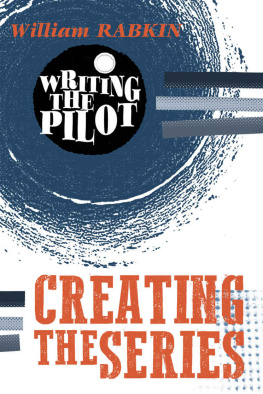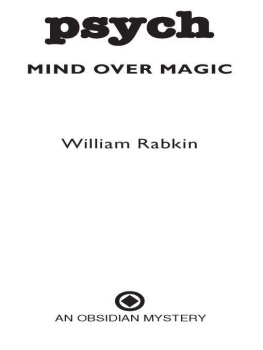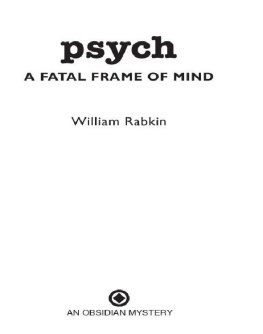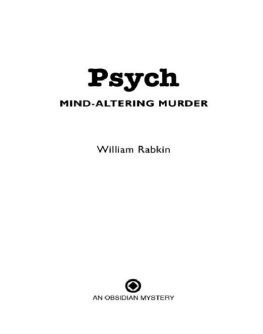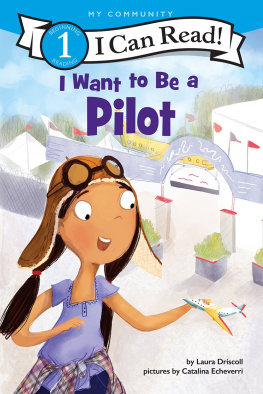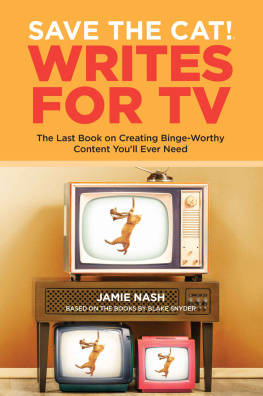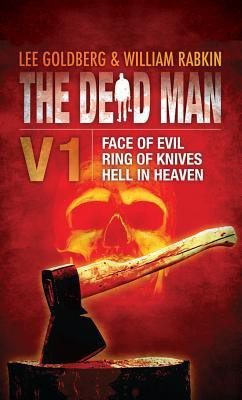William Rabkin - Writing the Pilot: Creating the Series
Here you can read online William Rabkin - Writing the Pilot: Creating the Series full text of the book (entire story) in english for free. Download pdf and epub, get meaning, cover and reviews about this ebook. year: 2017, publisher: moon & sun & whiskey inc., genre: Art. Description of the work, (preface) as well as reviews are available. Best literature library LitArk.com created for fans of good reading and offers a wide selection of genres:
Romance novel
Science fiction
Adventure
Detective
Science
History
Home and family
Prose
Art
Politics
Computer
Non-fiction
Religion
Business
Children
Humor
Choose a favorite category and find really read worthwhile books. Enjoy immersion in the world of imagination, feel the emotions of the characters or learn something new for yourself, make an fascinating discovery.
- Book:Writing the Pilot: Creating the Series
- Author:
- Publisher:moon & sun & whiskey inc.
- Genre:
- Year:2017
- Rating:3 / 5
- Favourites:Add to favourites
- Your mark:
- 60
- 1
- 2
- 3
- 4
- 5
Writing the Pilot: Creating the Series: summary, description and annotation
We offer to read an annotation, description, summary or preface (depends on what the author of the book "Writing the Pilot: Creating the Series" wrote himself). If you haven't found the necessary information about the book — write in the comments, we will try to find it.
Writing the Pilot: Creating the Series — read online for free the complete book (whole text) full work
Below is the text of the book, divided by pages. System saving the place of the last page read, allows you to conveniently read the book "Writing the Pilot: Creating the Series" online for free, without having to search again every time where you left off. Put a bookmark, and you can go to the page where you finished reading at any time.
Font size:
Interval:
Bookmark:
Writing the Pilot:
Creating theSeries
By William Rabkin
Copyright 2017 by moon & sun &whiskey inc.
No part of this book may be reproduced ortransmitted in any form or by any electronic or mechanical means, includingphotocopying, recording, or by any information storage and retrieval system,without the express written permission of the author or publisher, except wherepermitted by law.
All Rights Reserved.
Introduction:Why This Book Why Now?
Welcome back. Nice to see you again.
I have to say, I didnt think wed be backhere. When I finished Writing the Pilot a few years back, I figured Idmanaged to cram everything I had to say on the subject in that little 90-pagepackage.
But that was 2011, and in the years thathave passed, a lot has changed about the television business.
And when I say a lot, I mean everything.
Yes, everything.
The way series are bought.
The way series are conceived.
The way stories are told.
The way series are consumed.
The kinds of stories that can be told.
The limitations on content at every level.
The limitations on form at everylevel.
And maybe most important of all:
The restriction on who is allowedto sell a series.
I dont think anyone realized it at thetime or maybe it was just me but the period in which I wrote Writing thePilot was the twilight of the classical network model of televisiondevelopment, production, distribution, and consumption. Its true that cablenetworks both premium and pay were establishing themselves as homes for greatdrama, and I wrote about many of them in that first book. But we were stillliving essentially in the era of the 22-episode season, and the entireindustrys center of gravity was still located solidly among the four majorbroadcast networks.
As I write this in the winter of 2017,however, that center of gravity has abandoned the old networks and settled well, no one can say, exactly, but anywhere else. Last year The Good Wifefinally came to an end on CBS the one network drama routinely compared to thebest of what cable and the streaming services have to offer and with it thedream of a major network show that was the best the medium had to offer.
Its true that the traditional networksstill have the occasional hit, but for the most part those are big, glossy,stupid summer blockbusters or tired echoes of old reruns aimed at an audiencethat yearns for the straightforward simplicity of shows like Mannix and TheStreets of San Francisco. Successes like Quantico and Blackoutare the equivalent of disaster movies and second-rate superhero films excellently crafted, thoroughly entertaining, and entirely forgettable whileNBCs Chicago procedurals and CBSs parade of identical crime shows about teamsof pretty people working under some former TV idol to fight a new evil in 42minutes every week are aimed at audiences who dont like to pay much attentionwhen theyre watching TV.
Its not entirely a wasteland on thenetworks; sometimes a creative, original series gets through and manages tothrive. But even the people who make shows like Scandal and Empirecome off sounding surprised that they are doing what they do where theyredoing it. And if youve read an interview with The Good Wifesshowrunners Robert and Michelle King over the last few years, they wereconstantly complaining about the pressure of competing with shows that producedless than half as many episodes, allowing the creators to lavish far more careon each hour than was possible in the network environment.
So if the classical model is dead, whathas replaced it? That turns out to be a surprisingly hard question. The onething that everyone seems to agree on right now is that were in a transitionalperiod. We know where were coming from, we can look around and see where weare at this very moment, but we have no clue where were going or how well getthere.
As of this writing, there are somethinglike 435 scripted shows on the air except, of course, theyre not really onthe air anymore. Thats broadcast, cable, and the major streaming services.But that doesnt begin to count the literally uncountable number of web serieson YouTube and Vimeo and who knows where else.
Thats mostly baffling to us as viewers.Whats far more confusing about the future is that there are probably almost asmany business models for broadcasters out there, and no one knows which oneswill prevail. Broadcast networks depend almost entirely on advertising dollars.Basic cable networks live on ad revenues and per-subscriber payments from cableand satellite systems. Netflix gets their money from subscribers; Hulu from amix of subscriptions and advertisers and sells a premium subscription thatremoves those commercials; Amazon Prime programming is given away to people whopay $100 per year for two-day delivery on Amazon orders.
And thats just the beginning. Netflixthreatens to revolutionize TV consumption by releasing entire seasons of theirshows at the same time; Hulu parcels out their originals one episode per week,just like a network. (As a viewer, I cant tell you how infuriatingly old-fashionedthis feels in comparison to the Netflix model .) Amazon Prime puts theirpilots up on line and asks viewers to decide which ones deserve to becomeseries.
Which of these models will succeed in thelong run? What will the experience of watching a TV show be like in five years or ten?
Nobody knows.
But unless youre planning to start adistribution system in the next few years, this shouldnt really matter to you.Were writers. We tell stories. We can leave it to the suits to decide how todeliver them.
Cant we?
It turns out we cant. Because the changesin the delivery model are actually affecting the way our viewers watch ourshows and that in turn is affecting the shows that are being bought andproduced. It turns out that we approach a series differently if were going tobinge an entire season in three days instead of taking it week by week. Andwhile you might leap to the conclusion that this only applies to shows producedfor Netflix, thats actually not true the market for syndicated reruns onindependent and cable channels is mostly dead, and the afterlife for almostevery drama currently produced will be on a streaming service. So in thosecases you are writing for two completely different audiences.
And this is only the beginning of theforces that are changing the ways stories are told on television these days.Who could have guessed, for example, that a change in the way networks counttheir viewers would result in a huge acceleration in the pace of storytelling?Or that an overabundance of outlets would lead to a complete liberalization ofthe kinds of stories that would be allowed to serve as foundation for a series?
TV drama storytelling has been changingconstantly since the turn of the millennium, but the pace of that change seemsto accelerate with every passing television season except that there reallyisnt any such thing as a television season anymore. Series are getting biggerand faster and also slower and smaller. A hit show from even five years agocan look hopelessly dated in this new world.
And the only thing thats certain is thateverything is going to keep changing.
Well almost everything. Because the oneconstant in this new television world is the need for great writing. Strongconcepts, rich characters, intriguing plots.
And more even than great writing: a voice.
Theres a desperate hunger out there for afresh, original vision, something that can cut through the clutter of all thosehundreds of other shows out there.
But in order for that voice to be heard,its got to be singing the kinds of songs that networks and streaming servicesneed to hear. (Wow ever get stuck on a metaphor and couldnt find your wayoff? Sorry about that .)
Font size:
Interval:
Bookmark:
Similar books «Writing the Pilot: Creating the Series»
Look at similar books to Writing the Pilot: Creating the Series. We have selected literature similar in name and meaning in the hope of providing readers with more options to find new, interesting, not yet read works.
Discussion, reviews of the book Writing the Pilot: Creating the Series and just readers' own opinions. Leave your comments, write what you think about the work, its meaning or the main characters. Specify what exactly you liked and what you didn't like, and why you think so.

